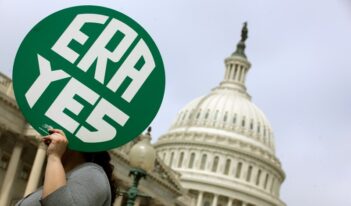
Scholar discusses current sports betting regulation in the United States and a case that could change it all.
Gamblers in the United States wagered nearly $4.2 billion on the 2016 Super Bowl game between the Denver Broncos and the Carolina Panthers. About 97 percent of these bets were made illegally, according to the American Gaming Association.
Why do most gamblers in the United States resort to placing illegal bets on sporting events? Brad R. Humphreys, a professor at West Virginia University, claims that “U.S. sports betting is regulated by a series of poorly coordinated laws” that make betting on sporting events illegal “almost everywhere,” leaving most Americans with no legal channels for betting. Humphreys, however, predicts that the current patchwork of sports betting regulation may soon change once the U.S. Supreme Court hands down its decision in a case challenging a New Jersey gambling law.
At issue in Christie v. National Collegiate Athletic Association, the case before the Supreme Court, is a 2014 New Jersey law that would legalize sports betting at casinos and racetracks within the state. Several sports leagues challenged the state law as conflicting with the Professional and Amateur Sports Protection Act (PASPA), which regulates sports betting across the United States. The 2014 New Jersey law has been blocked from taking effect pending the Supreme Court’s decision in this case. If the Supreme Court finds that the 2014 New Jersey law did not violate PASPA, the decision would weaken PASPA and allow all states to decide whether to legalize sports betting within their borders.
The regulation of sports betting currently consists of a combination of laws. The keystone legislation, PASPA, prohibits sports betting in all states where no legal sports betting framework existed at the time of passage in 1992. In four states where such a framework existed—Nevada, Delaware, Montana, and Oregon—PASPA limits sports betting to the exact framework that existed at the time of passage.
Humphreys finds it difficult to justify PASPA for economic and legal reasons. On economic grounds, PASPA seems to grant Nevada a monopoly on “betting on individual sporting events in the United States,” while banning it elsewhere. It also grants a monopoly on certain other forms of sports betting, such as “parlay betting”—betting on different outcomes in three or more sporting events occurring in a given week—to Delaware, Montana, and Oregon.
Humphreys argues that, on legal grounds, PASPA may violate both the Fourteenth Amendment and the Commerce Clause of the U.S. Constitution. Humphreys contends that PASPA violates the Fourteenth Amendment, which mandates equal treatment of all citizens, because the law allows some U.S. citizens to bet legally on sports while denying this opportunity to others. Additionally, PASPA does not apply uniformly to all states, which Humphreys insists violates provisions of the Commerce Clause requiring Congress to “pursue uniform regulation of commerce among the states.”
According to Humphreys, PASPA’s approach to sports betting regulation has generated “widespread illegal sports betting markets throughout the country”—because only individuals in certain states can legally bet on sports—and does not follow the typical approach to regulating a good or service that produces negative side effects or consequences. Humphreys notes that gambling in general, and sports betting specifically, can cause its participants to experience “extreme financial, psychological, or physical distress” because of a lack of control that can potentially result in life-altering issues.
Humphreys observes that many U.S. sports leagues, including the National Basketball Association (NBA), Major League Baseball (MLB), and the National College Athletic Association (NCAA) have historically opposed efforts to legalize sports betting. Yet, some sports leagues have recently taken a softer stance on legalizing betting. For instance, NBA Commissioner Adam Silver has called for a new approach that permits sports betting but relies on federal regulation to avoid damaging the “integrity of the game.”
According to Humphreys, this damage could come in the form of “match fixing,” where individuals involved in the sporting event attempt to profit financially by betting on the sport while taking actions that influence the outcome.
Humphreys rebuts the argument that legalized betting will bring about an increase in “match fixing.” Sports betting, Humphreys notes, is legal throughout Europe. Yet, legalized betting does not seem to have affected the integrity or popularity of European football leagues.
New Jersey has attempted to legalize sports betting since 2011, when voters passed a referendum calling for the state to legalize sports betting. The following year, former New Jersey Governor Chris Christie signed into law the Sports Wagering Act, which legalized sports betting at casinos and racetracks within the state. The NBA, MLB, National Hockey League, and the NCAA immediately filed suit to block the law from taking effect, which caused the state to re-draft its law in 2014. The sports leagues challenged that law, as well, and in 2016 the U.S. Court of Appeals for the Third Circuit held that “PASPA, by its terms, prohibits states from authorizing by law sports gambling, and because the 2014 Law does exactly that, the 2014 Law violates federal law.”
Following this loss, former Governor Christie filed a petition in the Supreme Court for a final decision on the issue.
The Supreme Court heard oral argument in Christie v. National Collegiate Athletic Association in December 2017, and a decision is expected this year. Depending on how the Court rules, the decision could have enormous effects on the current sports betting regulatory landscape.



